
BNAO participated in a parallel audit „Workforce 2030 - challenges and opportunities'“
GLOBAL TRENDS & CHALLENGES FOR WORKFORCE 2030
The world is undergoing momentous, rapid changes, as part of what is often called "the Fourth Industrial Revolution". New technologies blur the boundaries between the physical, biological and digital worlds, with unprecedented speed, extent and influence. These trends accompany other social and economic processes which impact labour markets:
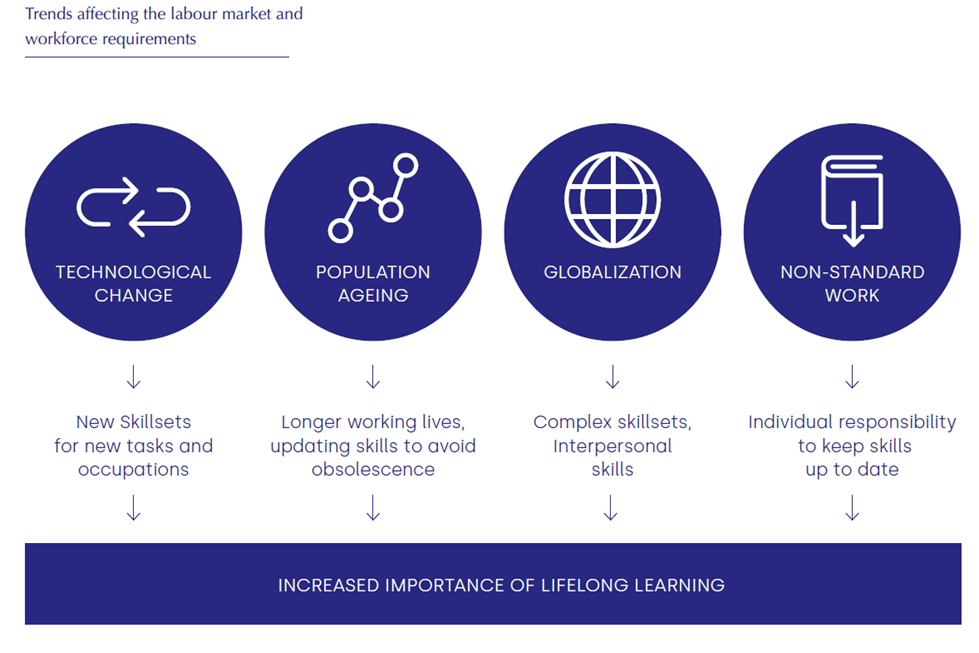
Workforce 2030 - Challenges and Opportunities' was conducted as a parallel audit under the auspices of EUROSAI Strategic Goal 1 - Supporting effective, innovative and relevant audits by promoting and brokering professional cooperation. The Office of the State Comptroller and Ombudsman of Israel led the project with the following participating SAIs: National Audit Office of Bulgaria, European Court of Auditors - ECA, National Audit Office of Finland, The Court of Audit of Italy, State Audit Office of the Republic of North Macedonia, and the Board of Audit and Inspection of the Republic of Korea (from ASOSAI).
The project set out initially in March 2019, when in it was introduced in a workshop during the III EUROSAI ASOSAI Joint Conference, held in Jerusalem (Israel). The cooperation on the project included a kick-off meeting in Helsinki (Finland) in September 2019, a second meeting in Tel-Aviv (Israel) in January 2020, and a third meeting - held virtually and led by SAI Bulgaria - in October 2020. SAI Israel had also set up an online collaboration platform, where the participating SAIs could hold discussions and share information and materials. More than 150 files and links were uploaded there during the project.
Workforce 2030 themes: Within the wide-ranging issues relating to Workforce 2030, the parallel audit focused initially on three themes:
- The Education System and Higher Education - How are they preparing for changes in the labour market?
- Vocational Training & Adult Learning - How are governments adjusting their vocational training plans to the evolving and disappearing professions and industries? How are they addressing the growing need for reskilling, upskilling and LifeLong Learning for adults?
- Governmental Planning - How do governments address market failures and plan their investment faced with a dynamic labour market?
In relation to these three themes, a fourth theme emerged:
- Digital Skills - How do governments promote digital skills of varying levels for children and adults?
Each participating SAI chose which themes to focus its national audit on. The different themes naturally overlap somewhat. The following figure presents the distribution of the audits and reviews that form this consolidated report, across the different themes:
In the consolidated report each of SAI's report is preceded by some local background information, offering basic workforce indicators for the country - including indicators of Demography, Economy, Employment, Education, Training, Skills, and Policy, as well as main country Trends, Challenges, and Strong Points with regard to workforce 2030. Thereafter, a concluding Insights section is presented, offering examples of policies from the participating countries relevant to workforce 2030, as well as relevant other audit assignments the participating SAIs undertook, ending with concluding remarks and thoughts for the future.
BULGARIA BASIC WORKFORCE INDICATORS
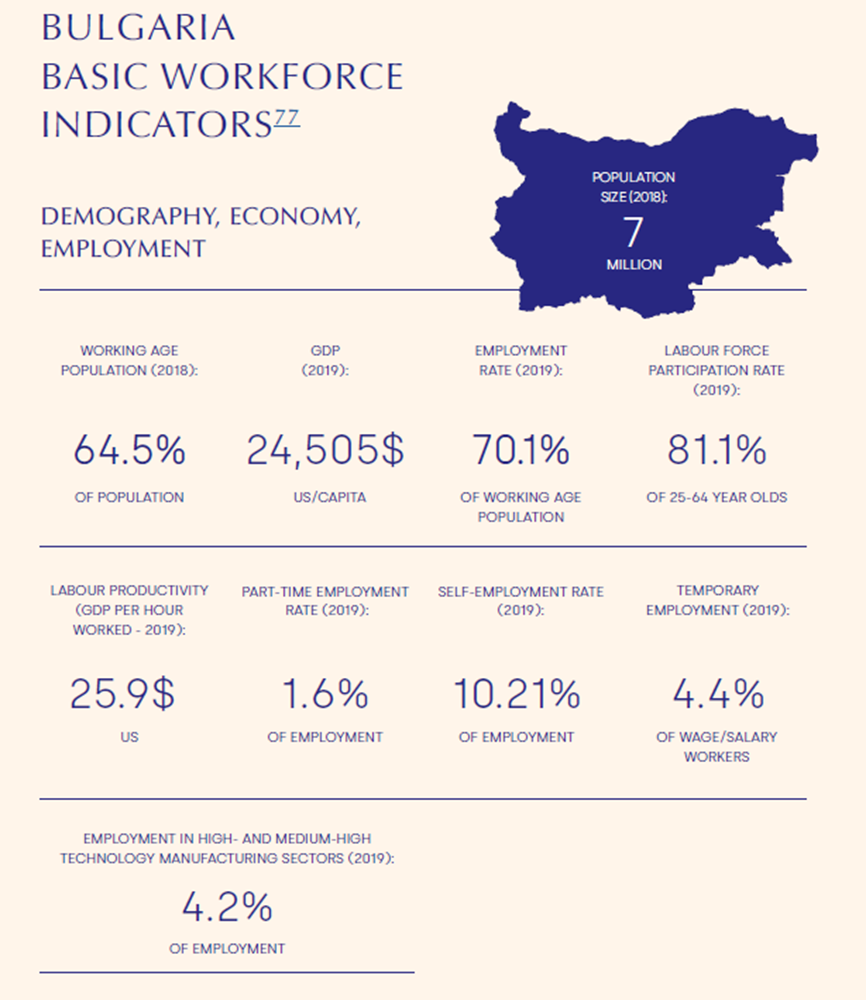
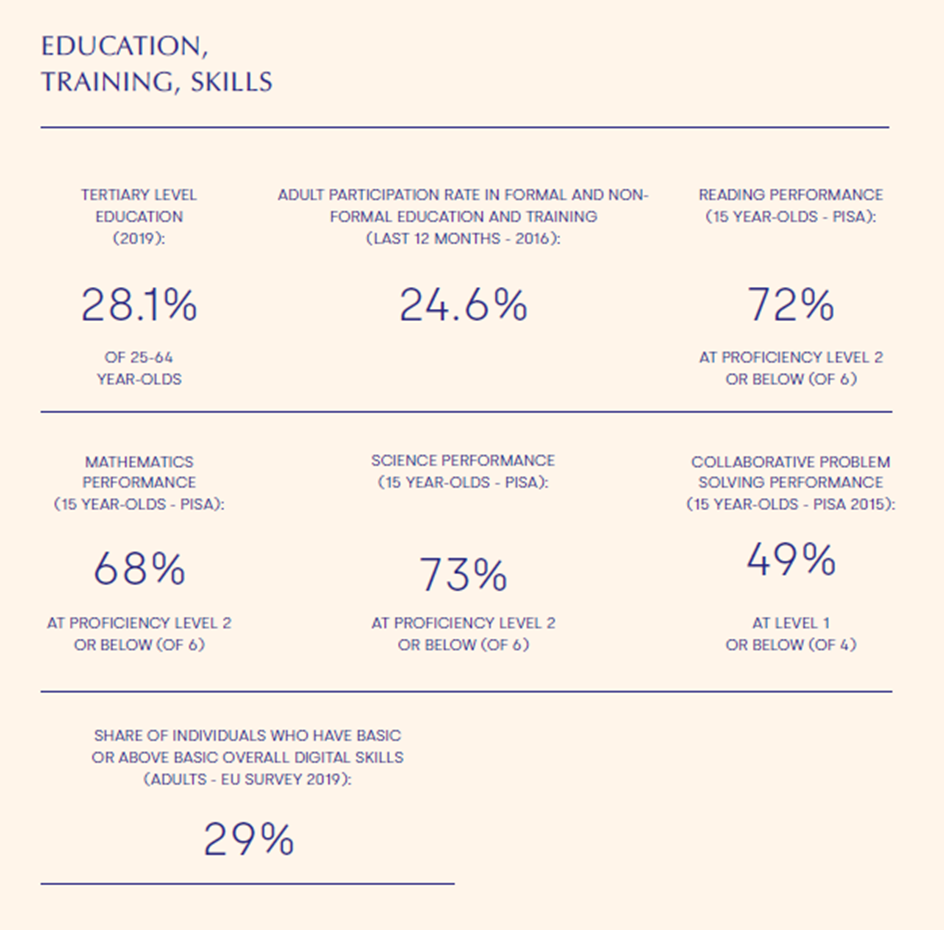
BNAO AUDIT REPORT: VOCATIONAL TRAINING OF ADULTS
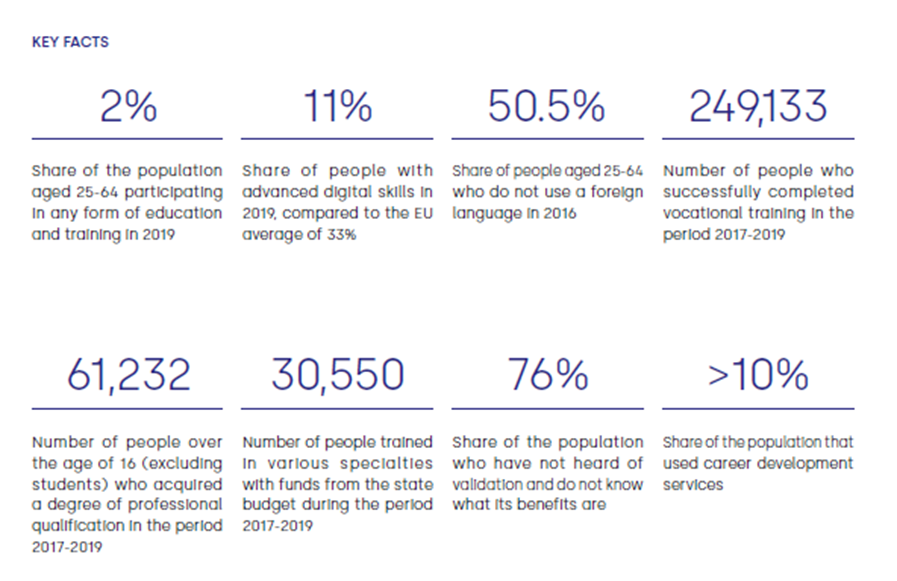
KEY FINDINGS
Willingness to overcome the challenges that the workforce is facing
During the audited period, actions were taken to ensure the state policy in the field of labour market and labour force training with analyzes, studies and forecasts, however there are opportunities for improvement in the analytical, research and forecasting process
Challenges for labour market policy outlined in the forecast until 2034:
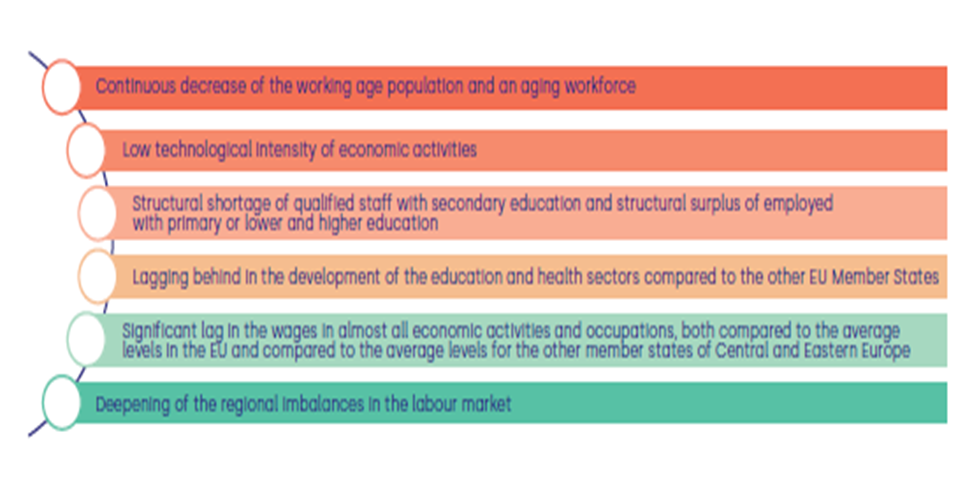
The study of employers' workforce needs has to be improved
A variety of means were applied in order to study the training needs of the workforce, but they still do not support effectively enough the policy management at the national level
The system for forecasting the skills that will be needed for the labourmarket in the future is not fully developed
In 2020, a study of the generational characteristics of the workforce in Bulgaria was conducted, which can be considered as a good practice
The National Competency Assessment system is also a useful mechanism that can be upgraded and promoted further
During the period 2017-2019, actions were taken to introduce and build mechanisms aimed at overcoming the shortage of specialists in the labour market, but it is too early to make an objective assessment of their effectiveness. From the point of view of the principles of good governance, however, there are opportunities, incl. regulations to improve the organization and effectiveness of these new and important tools.
According to the data of the Health Profile for Bulgaria for 2019, a product of the joint work of the Organization for Economic Cooperation and Development (OECD) and the European Observatory on Health Systems and Policies in cooperation with the European Commission, the number of nurses in
Bulgaria is the second lowest in the EU after Greece.78 The lack of nurses in the country was reported as a problem by the Minister of Health in 2019.
The lack of highly qualified staff in the health care system is indicated as a problem in the Analysis of socio-economic development, which was used as a basis for preparing NDP Bulgaria 203079 and overcoming the shortage of medical specialists is part of the Council's recommendations on the National Reform Program of Bulgaria for 2018 and the Convergence Program of Bulgaria for 201880. In the preliminary partial impact assessment of the draft decree amending the Council of Ministers Decree № 64 of 2017 it is stated that the need for training more specialists in the professional fields "Public Health" and "Health Care" is identified.
The vision and goals of the Bulgaria's development policies until 2030 are also focused on the quality of human capital, but there is no assurance that the scale of the need for retraining and further training of the workforce, which is forthcoming by 2030, is clear enough.
Effectiveness of career orientation and training of adults in the context of lifelong learning
Encouraging lifelong learning is among the priorities and strategic goals of the public authorities in Bulgaria since 2008, but the progress over the last 12 years is insignificant and the national goal for 2020 for adults participating in education and training activities is not achieved.
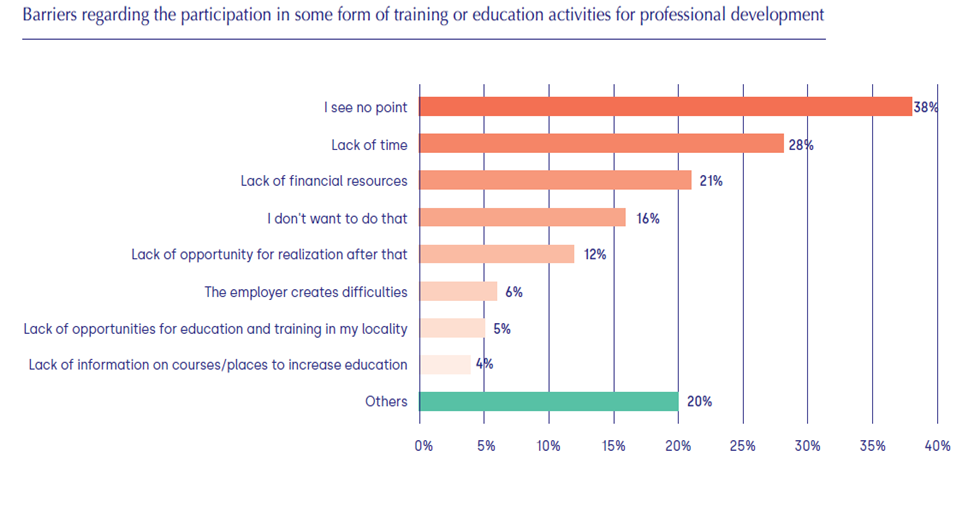
The system for vocational orientation for adults in Bulgaria still does not effectively support individuals for their realization on the labour market, as the provision of vocational orientation services is still a challenge for all participants in the process.
Excerpt from the results of the specific techniques applied for collecting audit evidence for evaluation of the career orientation services of the Employment Agency.
CONCLUSIONS
The actions of the Ministry of Labour and Social Policy and the Ministry of Education and Science aimed at adequately addressing the growing need for the acquisition of new knowledge and skills, retraining and lifelong learning in order for the individuals to better realize themselves into the labour market are not effective enough. Further efforts are needed to successfully address the challenges that the workforce is facing, posed by information technology developments and demographic change, which are set to deepen in the medium and long term. However, effectively addressing the challenges depends not only on public authorities, but also on the attitudes, awareness and understandings of employers and citizens about the importance of the lifelong learning process.
KEY RECOMMENDATIONS
As a result of the conducted audit, the Minister of Labour and Social Policy and the Minister of Education and Science were given a total of 49 recommendations aimed at:
- improving the analytical and forecasting process for the development of the labour market and the needs of the workforce, incl. for training of adults;
- upgrading and maintenance of a system for forecasting the public needs of certain professions, skills and competencies, incl. in promising and key sectors in the economy;
- synchronizing the strategic goals for adults participating in education and training activities and providing the necessary conditions for effective monitoring of the implementation;
- increasing the efficiency of career orientation services and guaranteeing the right of jobseekers to use a public career orientation service of the same quality;
- increasing the effectiveness of adult training policy;
- providing the necessary preconditions for making the validation into an effective tool for facilitating access to the labour market.
-------------------------------------------------
THE CHALLENGES OF THE CHANGING LABOUR MARKET PRESENT EXTENSIVE AUDIT OPPORTUNITIES FOR SAIS
The technologies and social trends that are reshaping the labour market are already making an impact. Just recently, the economic and employment crisis stemming from the COVID-19 pandemic highlighted the importance of investing in the human capital for current workers, future workers (children and youths) and the unemployed - in order to increase their employability in a changing labour market. It is therefore up to governments everywhere into respond, and prepare for further transformations, throughout the various systems that are affected: public employment services; education systems; vocational and educational trainings; adult education programs; other public employment measures; higher education systems; and public service management. This report aspires to contribute to raising awareness to the challenges and opportunities of Workforce 2030, in the national governments of the participating SAIs, as well as in other countries.
The participating SAIs acknowledge the diversity of issues stemming from workforce challenges, and therefore are themselves committed to continue auditing various aspects of this topic.
Moreover, the COVID-19 pandemic and ensuing economic and employment crises, have put extra pressure on labour markets, requiring still greater efforts on the part of governments to ensure the resilience of their workforce. SAIs have the power and competence to hold their governments accountable in this respect, through up-to-date audits on the evolving challenges resulting from labour market changes.
Finally, SAIs have an important role in safeguarding the livelihood and rights of citizens, in promoting SDGs, and in ensuring government efficiency and effectiveness - all of which are threatened by the ever-changing demands from the workforce. SAIs may take a leading part in promoting solutions towards a new equilibrium.

